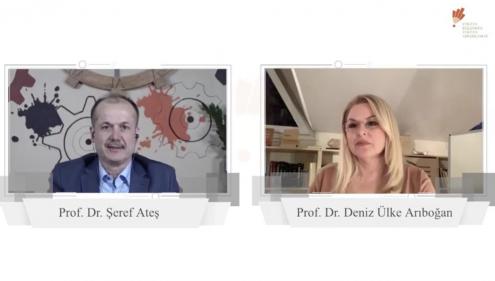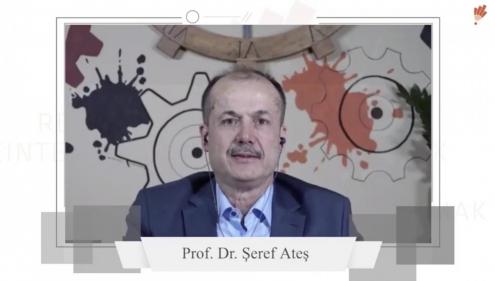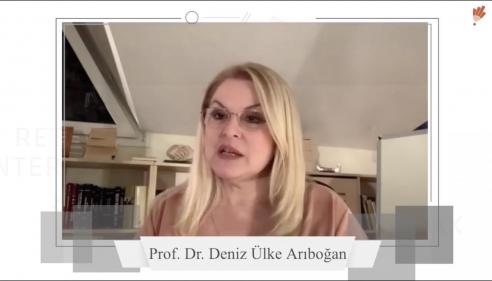Deniz Ülke Arıboğan hosted at 'Rethinking, Reinterpreting'
Yunus Emre Institute President Prof. Dr. Şeref Ateş hosted Prof. Dr. Deniz Ülke Arıboğan, a leading scholar of international relations, at his program "Rethinking, Reinterpreting," aired on the social media accounts of Yunus Emre Institute with the participation of distinguished figures every week.
At the beginning of the program, our Institute President Prof. Dr. Şeref Ateş noted: "As an institution which produces and deals with culture and science, we have launched a program, a mental journey, in order to put temporary problems and daily political hustle aside and assess the outbreak process, rethink and reinterpret the events. With scholars and scientists from Turkey in particular and around the world in general, we have discussed the issues in depth, not the superficial problems, but the ideas beneath those problems, and we have realized that we are not alone in this quest. Indeed, our program is broadcast also in English and Arabic simultaneously, and we are glad to see the strong interest in similar matters around the globe. We will continue to bring Turkey's assets to the world."
Our Institute President Prof. Dr. Şeref Ateş asked: "In your book, "Duvar" (Wall), you talk about mankind's basic need for walls and note that there are increasingly more walls built around the world and an increased emphasis on boundaries, especially in the face of perceived threats. It seems that wall-builders will be very busy after this pandemic. That is, walls continue to be built. What do you think will be the post-pandemic situation?" Deniz Ülke Arıboğan's response was as follows:
"What has happened to turn our world from a no-boundary, permeable global village to a walled garden, i.e., new and security-focused environment? In other words, wall, here, is a metaphor. They are built as a symbol of the spirit of the old times. In 1987, two years before the demise of the Berlin Wall, Ronald Reagan gave a speech at the Brandenburg Gate. He said, 'Mr. Gorbachev, tear down this Wall' and the commotion ensued. Two years later, it could not be stopped. That wall was torn down. It was the slogan of a world shaped by the leadership of the US. Tear down the walls, tear down the Iron Curtain, abolish and open the borders; let us establish a common market and let cultures get fused. It was a 'Mac World': Mc Donald's, Macintosh. It was a world built upon the computer systems that evolved with Mac's, as well as culinary sectors, weapons industry, etc. Indeed, the foodstuff consumed by our kids has become the same; and they were listening to same music; and there were the same global fashion trends. Notions such as locality were used to a great extent. But the focus was certainly on universality, one designed by the powers that be of the system, rather than on locality. It seemed that we were moving toward such a world and human mobilization had increased. Global finance was benefiting from the freedom of lack of geographical restrictions all around the world. In other words, it sets off from Hong Kong in the morning, and moved to New York in 10 seconds, and then to London and Singapore. Global funds were moving in this manner and there was intense trade, foreign investments and cultural intermingling. There were restaurants, selling Japanese sushi, Turkish pide or döner, or Greek pita.
It appeared that there was no turning back from this development and we were young in the 1990s, the main talk was about globalization. When Google first emerged as a search portal, the most frequently searched concepts included global, globalization, etc. These were the buzzwords. We would append 'global' to every concept. Nothing would happen without 'global'. However, 21st century came with very interesting crises. I call the current pandemic as the third global crisis. The new generation saw three great crises that wreaked havoc across the world during the last 20 years. In other words, the young people aged 20 have seen three global conflicts. The 9/11 attacks and extensive global terrorism perceptions emerging from them and the coming of a security-centered approach, i.e., shifting the economic sources of the world from peaceful industries, education, healthcare, cosmetics to military industrial complex. What did it mean? The global defense expenditure rose from 780 billion dollars to 1.94 trillion dollar today. This was the first component. It was followed by the 2008 economic crisis. This second great crisis allowed economic sources on the world from global players and non-state actors to states. No market could survive without support from the state and new capitalist models emerged, like China and Russia. They survived. The greatest blow was to the states representing the very liberal capitalist center of liberal the system. The European Union and the transatlantic alliance sustained the damage. The current one was the third global crisis during the last 20 years. In each step, in each crisis, the world moved on to another track, like the rerailing of the train. In other words, the training changed its course completely during the last 20 years and the walled world has something to tell us. We have to understand it. When the states start to build walls around their borders, they tell us something. The other side of this wall does not belong to us; there is no such thing as a global village. There is my village. Inside my village, my citizens have to be consolidated and they have to be attached to each other, and we cannot bother with sub-identities. Everyone will have a supra-identity, one related to citizenship, and there will be loyalty to the state. In other words, the entity to which the liberal order refers as individual has been reverted to citizen. What is the difference between an individual and a citizen? An individual has freedoms. A citizen, on the other hand, has responsibilities and duties. The state creates centers and divides the world. Integration divides the world."
Our Institute President Prof. Dr. Şeref Ateş said: "As a cultural institution, we would like to understand what the 21st century offers to people culturally within the globalization which we define as the post-industrial civilization. Looking at Istanbul, we see a huge city. It is no different from Paris, Tokyo or any US city. That is, the basic instinct or desire of people is to make savings on time and place or they go from one place to another with speed in order to overcome time or place. Yet, all places are alike. The historical works in Rome are different from those in Istanbul. But, everything from airports to hospitals is the same. The world is becoming the same. Is this what the 21st-century civilization offers?" In response, Deniz Ülke Arıboğan said:
"Man is not a creature that is left alone; rather, man is a creature that is being trained. And he is not aware of this. Since birth, we constantly intermingle with the very fabric of our culture, don't we? In other words, when you are born to a Muslim community, you acquire Muslim values and start to be infused with that culture. That culture does not leave you unchanged. Rather, it turns you into someone else. Then, you undergo an education process. The powers that be determine the very sacred values of the time and you design education in line with those values. You describe the ethical vision. That is, you try to be part of that society, or universal culture.
What is Yunus Emre Institute important? It represents a local and national approach in the face of the global templates imposed on us. We have never been a community that has adopted the extremely individualistic model championed by that globalization-centered culture. We are human beings acting as "us." That is, we can never go to bed full when a neighbor is hungry. Europeans or Westerners may have a culture of aiding each other, and people may donate money with an urge from their conscience. This is the normal of our community: aiding people. It is not abnormal. Looking at the US, you may say it is very abnormal. A billionaire may donate a huge sum to a university for research purposes. We share our food with foreigners who sit next to us in a train. When you eat a sandwich, you insist, swearing in God's name, that a foreigner next you should take half of that sandwich. We are coming from such a culture. When we start to rule the world one day, everyone will start to share their sandwiches."
You can watch the program from the following links.
https://www.pscp.tv/w/1mrxmQMQvWDxy?t=5 (Turkish)
https://www.pscp.tv/w/1mrxmQMQvWDxy (English) https://www.facebook.com/yeearabic/videos/260621175390050 (Arabic)






